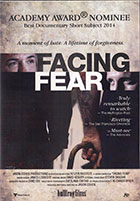
Facing Fear 2013
Distributed by Bullfrog Films, PO Box 149, Oley, PA 19547; 800-543-FROG (3764)
Produced by Jason Cohen
Directed by Jason Cohen
DVD , color, 23 min.
High School - General Adult
Crime, Discrimination, Forgiveness, Homosexuality, Multiculturalism, Social Psychology, Violence
Date Entered: 12/01/2015
Reviewed by Kathleen Spring, Nicholson Library, Linfield College, McMinnville, ORFilmmaker Jason Cohen traces the path from hate to forgiveness in this short documentary nominated for an Academy Award® in 2013. Told in tandem by Tim Zaal, a former white supremacist, and Matthew Boger, the victim of a hate crime in which Zaal participated decades earlier, Finding Fear explores the nuances of what it takes to forgive another person and what it takes to forgive oneself.
Early in the film, Zaal and Boger describe the conditions leading up to their chance encounter in the streets of Los Angeles, an encounter that ended with Zaal kicking Boger in the head and leaving him for dead. Boger, whose mother had thrown him out of the house at 13 for being gay, had been engaging in prostitution in order to survive. For Zaal, the earlier death of his brother at the hands of an African-American man stoked the fires of fear and racism, prompting him to turn to violence.
As the documentary progresses, we learn how another chance encounter at the Museum of Tolerance in Los Angeles (where Boger works) acts as a spark that ultimately leads Zaal and Boger down the path to forgiveness. Both acknowledge the process is not tidy; indeed, both recognize forgiveness, both internal and external, is something that continues to be negotiated as their relationship evolves.
The success of Finding Fear lies in the direct way in which Cohen tells Zaal’s and Boger’s story. Their relationship is complex, and Cohen does not attempt to simplify it or impose his own assessment of it on viewers. Instead, he rightfully trusts the film’s content will prompt reflection and discussion about issues of race, sexuality, stereotypes, violence, and forgiveness. Finding Fear would be a wonderful addition for school or public libraries looking for another tool that focuses on teaching tolerance; it would also be relevant for use in a variety of college courses, including psychology, sociology, and communication. Instructors might want to pair Finding Fear with Olivier Meyrou’s Beyond Hatred (2005) to provoke further discussion about the multiple paths forgiveness can take.